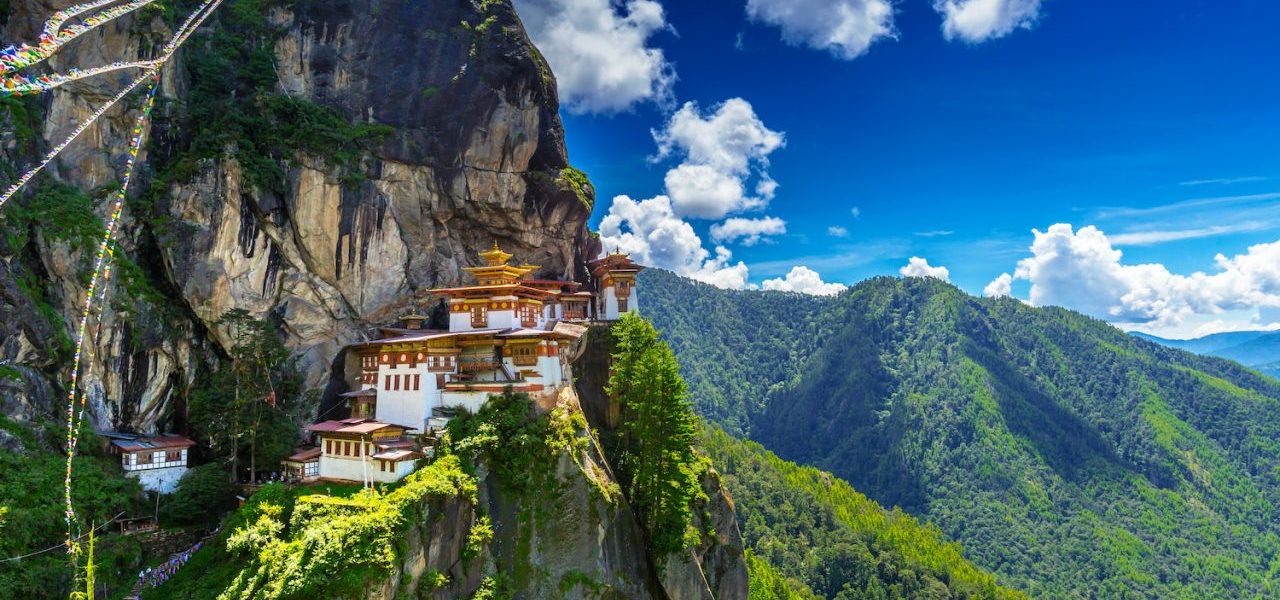Bhutan
Bhutan – Happiness is a Place!
The Himalayan Kingdom of Bhutan is fast emerging from centuries of self-imposed isolation. First opened to tourists in 1974, coinciding with the coronation of the fourth Bhutanese King, this mystical mountain kingdom remains one of the world’s most exclusive travel destinations. Thanks to the Royal Government’s far-sighted policies, Bhutan has carefully preserved its pristine environment and deep-rooted cultural heritage, successfully avoiding the harmful effects of mass tourism and rapid industrialization. This makes Bhutan a truly rare gem—a land of unspoiled nature, soaring Himalayan peaks, and timeless traditions.
Nestled in the eastern Himalayas, Bhutan is a country where people live in deep harmony with nature and spiritual values. The national identity is profoundly shaped by Mahayana Buddhism, particularly the Vajrayana tradition, which is not only Bhutan’s official religion but also a guiding force in everyday life. With a population of around 700,000 and a land area similar to Switzerland, Bhutan remains the only country in the world where this form of Buddhism is the foundation of both state and society.
The country’s geographical landscape is as dramatic as its cultural richness. Bhutan is entirely mountainous, with elevations ranging from just 100 meters in the southern plains to 7,541 meters at Gangkhar Puensum—believed to be the world’s highest unclimbed peak—along the Tibetan border. Between each valley lie high mountain passes, many reaching 4,000 meters, creating both breathtaking scenery and historically difficult inter-valley communication.
Bhutan has never been colonized, which has helped preserve its unique cultural identity. Buddhism was first introduced to Bhutan in the 8th century by the Indian saint Padmasambhava, known locally as Guru Rinpoche, who is deeply revered throughout the country. A major turning point in Bhutanese history occurred in the 17th century, when Zhabdrung Ngawang Namgyal, a great master of the Drukpa Kagyu school, arrived in Bhutan in 1616. He unified the warring valleys, established a central administration, and laid the foundation for the nation’s spiritual and political identity.
In 1907, Bhutan formally established a hereditary monarchy under Gongsar Ugyen Wangchuck, marking the beginning of the Wangchuck Dynasty. In 2006, His Majesty King Jigme Singye Wangchuck voluntarily abdicated in favor of a new political era, introducing constitutional monarchy and parliamentary democracy. Two years later, in 2008, Bhutan celebrated the centenary of its monarchy, held its first democratic elections, and crowned its fifth king, His Majesty Jigme Khesar Namgyel Wangchuck.
Bhutan today stands as a true sanctuary in the modern world—a majestic land of snow-capped peaks, fluttering prayer flags, centuries-old monasteries, and warm-hearted people. It is a destination where happiness is measured not by GDP, but by Gross National Happiness, and where visitors can experience the rare beauty of a living culture in harmony with nature.


